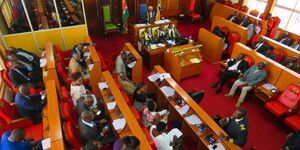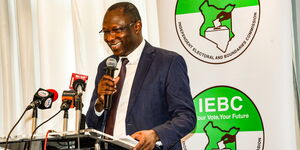The High Court has temporarily suspended the government’s directive requiring all state agencies and county governments to exclusively use the new Electronic Government Procurement (eGP) system for procurement.
In orders issued by Justice Bahati Mwamuye on Monday, the court granted conservatory measures halting the enforcement of a circular issued by the National Treasury and the Public Procurement Regulatory Authority (PPRA), which had made onboarding to the eGP system mandatory for all public entities.
The judge directed that until further orders are issued, public procurement entities should not be compelled to exclusively use the eGP platform. Instead, they are required to comply with Section 77(1) of the Public Procurement and Disposal Act, which allows the submission of tender documents in both electronic and manual form.
"A conservatory order be and is hereby issued staying the decision of the Cabinet Secretary, National Treasury & Economic Planning, and the Public Procurement Regulatory Authority's Circular No. E04/2025, which required the mandatory use of the Electronic Government Procurement System [e-GPS] by all Public Procurement Entities," Justice Mwamuye's orders read in part.
''All Public Procurement Entities shall comply with Section 77(1) of the Public Procurement and Disposal Act in that submission of tender documents shall be in writing and in either electronic or manual form; and such submissions shall comply with the other requirements of Section 77 generally and subsection (1) in particular.''
The court further ordered that the National Treasury and PPRA must accept and process both manual and electronic submissions equally, provided they meet the legal requirements under the Act.
Justice Mwamuye ruled that the conservatory orders will remain in force until October 15, 2025, when they will lapse unless extended or varied by the court.
Pushbacks
President William Ruto, Treasury Cabinet Secretary John Mbadi, and the Council of Governors have remained at loggerheads over the rollout of the eGP system. According to the CS, some counties and officials within ministries, state departments, and agencies (MDAs) have been attempting to secretly reintroduce manual procurement despite the directive that all entities migrate to the digital platform.
President Ruto had warned that it would not be business as usual for officials resisting reforms such as the adoption of eGP. He accused unnamed officers of sponsoring negative media reports linking the platform to inflated spending in an effort to discredit the system.
''I know there is resistance from e-procurement and accounting officers who do not want the system. That is why they are sponsoring headlines of how Mbadi spent billions in a non-working system. We will not be distracted by your noise, and I want to ask any official who is not willing to work with us to bolt out of government and look for another job,'' the Head of State said.
However, days later, county governors openly rejected the push to adopt the digital system, intensifying the standoff. Speaking at a press conference on September 1, the Council of Governors hit back at the Treasury, accusing it of sidelining counties in the rollout of eGP despite them being critical players in procurement.
The county chiefs dismissed claims that they were deliberately blocking reforms and instead pointed to persistent flaws in the Integrated Financial Management Information System (IFMIS). They warned that the same shortcomings risk being repeated under eGP unless concerns are addressed.












